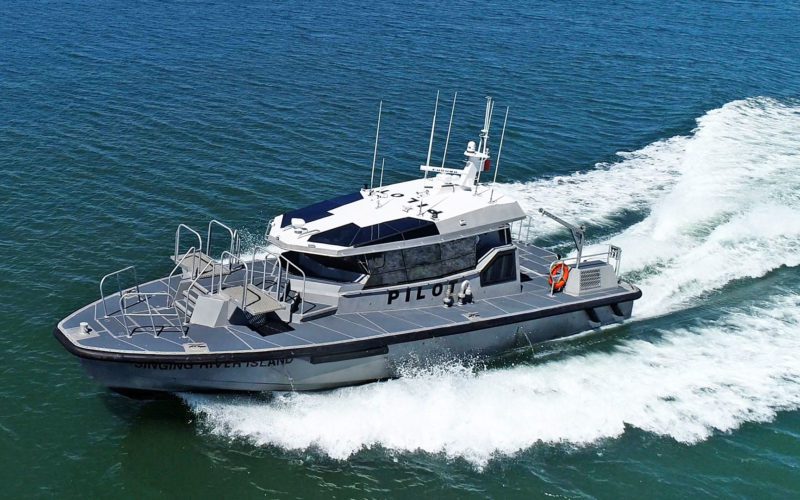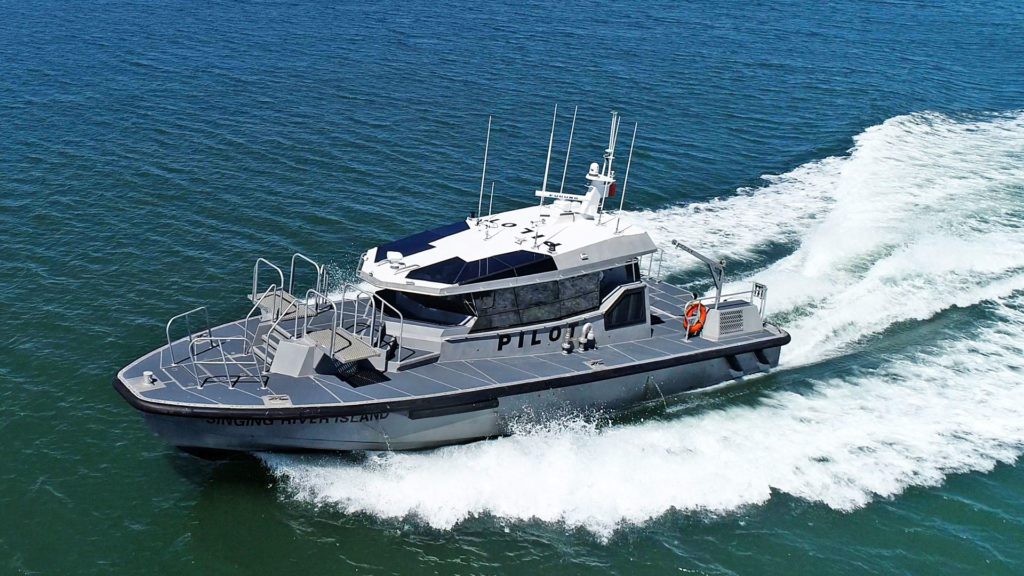
Sturdy launch keeps Pascagoula pilots all-weather ready
Capt. Walter Gautier stood on the aft deck of the new pilot launch Singing River Island in Pascagoula, Miss., as a 30-knot wind blew from the south.
“When it’s a sea like this,” Gautier said, gesturing toward the Gulf of Mexico, “this is the boat you want.”
The 55-foot Singing River Island is the newest and most versatile vessel in the Pascagoula Bar Pilot’s Association fleet. Metal Shark built the twin-engine launch using its well-established Defiant 55 platform developed specifically for pilot transfers.
The sturdy aluminum vessel entered service last fall alongside Round Island, the group’s everyday boat delivered by Metal Shark a decade ago, and Horn Island, its backup vessel. Singing River Island can do a little of everything, but the Pascagoula group said it excels in rough weather.
“Singing River Island’s best aspect is its weight coming in at 35 tons, contributing to its great ride in rough sea conditions,” said Darryl Langley, president of the six-pilot association that primarily serves the Port of Pascagoula.
“Also, the unique boarding platform on the bow allows us to extend the platform or retract it,” he continued. “If we need to use the extreme bow, we can access it via the centerline, which adds safety.”
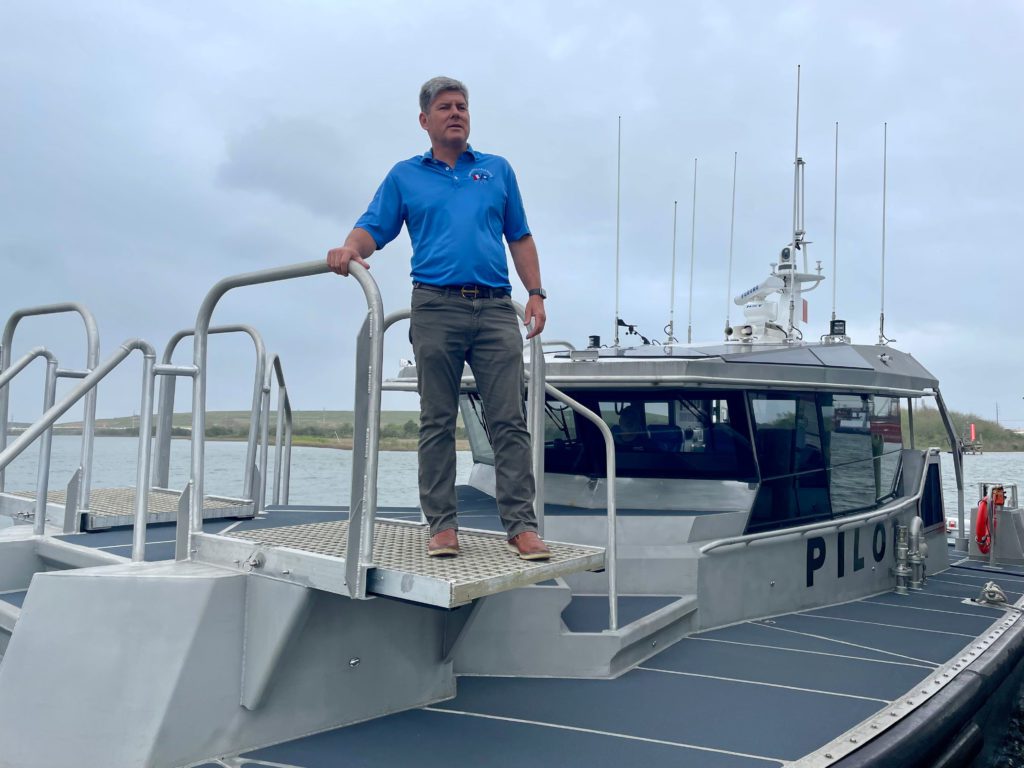
The Pascagoula pilots are based on Bayou Casotte, just across from the Port of Pascagoula, which is the largest in Mississippi. The site is home to a large Chevron refinery as well as public and private terminals that collectively move 25 million tons of cargo each year. Crude oil, refined products and forestry products including finished paper are among its highest-volume cargoes.
The region is also home to two major shipbuilders, Huntington Ingalls Industries and Halter Marine, both of which have active new construction and repair activities that occasionally require pilotage. The longest runs for the Pascagoula Pilots are around 14 miles into the Gulf of Mexico.
The Pascagoula Pilots established a relationship with Metal Shark more than a decade ago. At the time, the group was down to a single operational vessel and needed its new launch as quickly as possible. They considered multiple shipyards before arriving on Metal Shark, which offered to adapt a 45-foot vessel it was building for the U.S. Coast Guard.
“This was in September, and they called back the next day and said … we will have it for you by Thanksgiving,” Gautier recalled.
That vessel, the 39-foot Round Island, is a top performer for the pilots. It handles well, maneuvers confidently alongside a ship and can hit 38 mph thanks to three 300-hp Yamaha outboards. Round Island’s only real limitation is its relatively light weight, which limits its capabilities in rough weather. Singing River Island, named for a local island, has no such limitations.
“She’s a heavy girl but that is what you need for heavy weather,” said Gautier, who likened the ride to that of an Abrams tank.
The analogy isn’t too far off. Metal Shark is probably best known for delivering versatile patrol boats for the U.S. Navy and Coast Guard, as well as allied militaries around the world. Carl Wegener, the shipyard’s vice president of sales, said the sturdy hulls are built to exacting military standards.
The Defiant 55 hull form, he said, is built to be forgiving in rough weather. It features a deep-V forward with a variable deadrise that recedes moving aft toward the transom. Taken together, the vessel is designed for a comfortable ride in all conditions.
“It helps cut through the waves but it also gives you a little more hydrodynamic lift at the stern, so it helps you get over the hump faster … when coming to a plane,” Wegener said. “The rougher it is, the better this boat performs.”
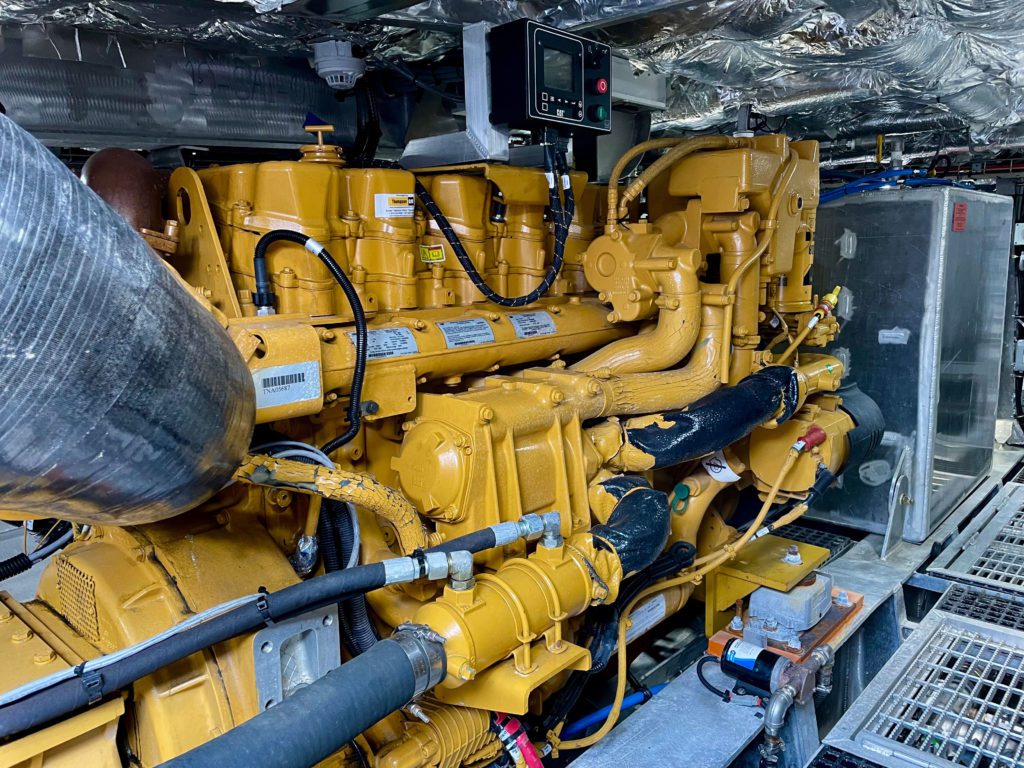
The propulsion package on Singing River Island consists of two Caterpillar C18 engines supplied by Thompson Caterpillar of Mobile, Ala. The two Tier 3 main engines drive four-bladed Michigan Wheel props through Twin Disc reduction gears. Its top speed is roughly 28 knots, with an efficient cruise speed of about 25 knots.
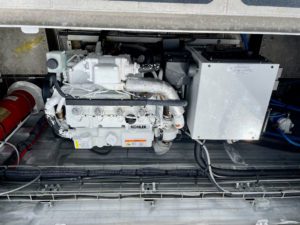
“The Pascagoula pilots needed the reliable performance of the C18 for years of service in a rugged application like this one,” said Richard Tremayne, marine sales manager for Thompson Cat. “It was a pleasure to work with the pilots and Metal Shark to help engineer these engines into the boat.”
Electrical power comes from a single 40-kW Kohler genset. Other critical components include a Jastram steering system, Twin Disc electric throttles and Humphree interceptors at the transom.
The Pascagoula pilots have six members, three of whom are on call at any given time. There is seating for six in Singing River Island in Llebroc helm chairs. The extra space allows the group to take the occasional passenger or facilitate crew changes offshore.
All three of the Pascagoula pilots’ launches are outfitted for a single operator. Capt. David Harris, who drives all three vessels, said Singing River Island offers an excellent overall ride. “Today we were doing 24 knots and we got into an 8-foot swell. Although we found the trough, we were talking out there like we are now.”
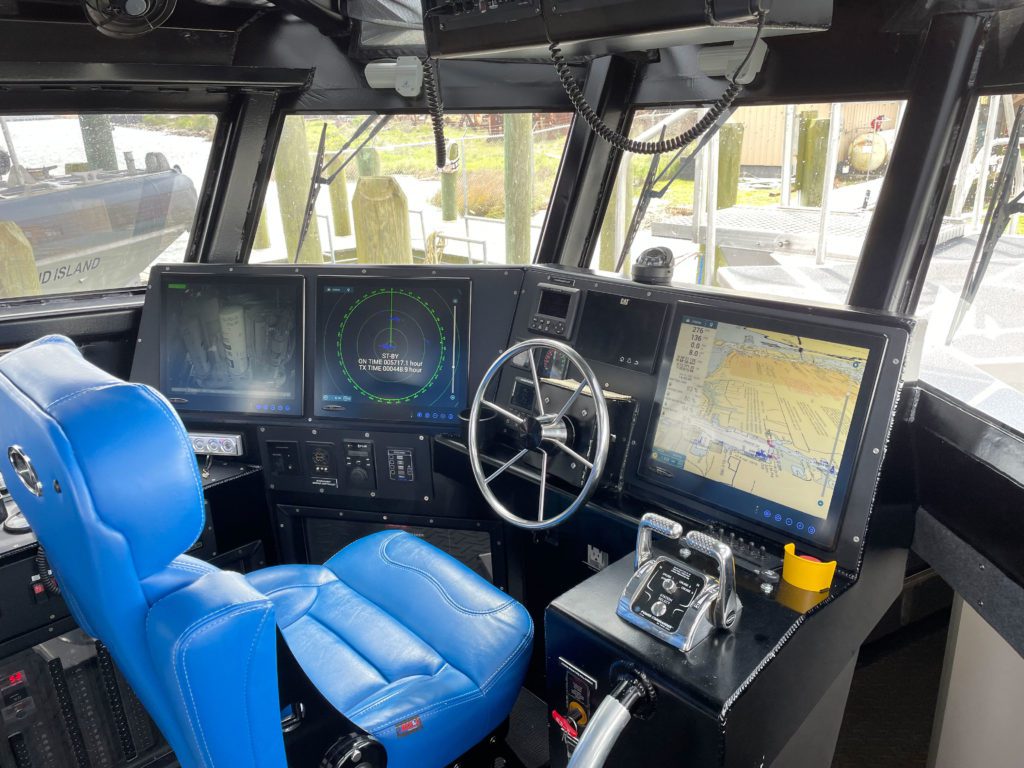
The chevron-shaped steering console is designed to put important displays, gauges and switches within the captain’s line of sight and within arm’s reach. The vessel is equipped with three 19-inch Nauticomp touchscreen displays integrated with Furuno radar, GPS and depth sounder.
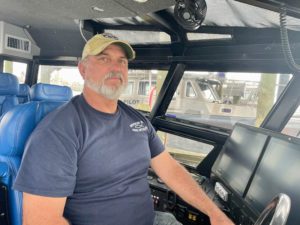
Singing River Island is also equipped with a side-scan sonar that lets the pilots assess channel depths following hurricanes and other powerful storms, Gautier said.
Forward visibility is excellent thanks to Metal Shark’s pillarless glass design. The boarding platform also was designed with wide openings to minimize obstructions. Windows on the ceiling let the operator keep eyes on the pilot as they move up and down the ladder.
There are numerous safety features built into Singing River Island. The pilothouse has a wraparound handrail leading to the boarding platform, which can be extended to port and starboard, thereby reducing the distance between the launch and the boarding ladder. The forward bow, as Langley described, also can be used for boarding. Trip hazards were eliminated around the boarding area.
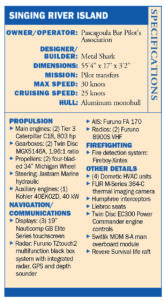 The aft deck has multiple tools to rescue a pilot who falls overboard. That includes a rescue davit with winch to hoist a person from the water. It also has a Switlik man overboard recovery system. Each pilot is outfitted with a Spinlock life vest with AIS transponder that activates in the water. The vessel also has a FLIR thermal imaging camera to assist with water rescues.
The aft deck has multiple tools to rescue a pilot who falls overboard. That includes a rescue davit with winch to hoist a person from the water. It also has a Switlik man overboard recovery system. Each pilot is outfitted with a Spinlock life vest with AIS transponder that activates in the water. The vessel also has a FLIR thermal imaging camera to assist with water rescues.
Like most pilotage groups, the Pascagoula pilots go home most nights. Even so, Singing River Island has a single bunk below deck for rest between piloting jobs. There is also a small head and storage for tools and other items. The mechanical space is accessible from the lower cabin as well as the aft deck.
The Pascagoula pilots are happy with the boat, its performance and the craftsmanship and support from Metal Shark. They’re already thinking about adding a sister boat to round out the fleet.
“It has done everything we have wanted it to do,” Gautier said. •

